Flat Stanley
We had a visitor in our class he was all the way from Doha. His name was Flat Stanley. We were given the task to have some adventures with Flat Stanley.
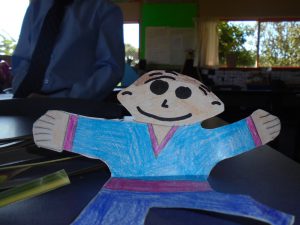
This is Flat Stanley!
The photos below show us with Flat Stanley weaving our stars.
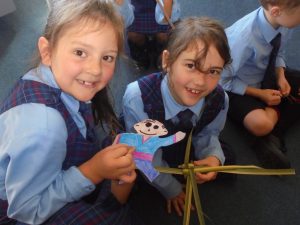
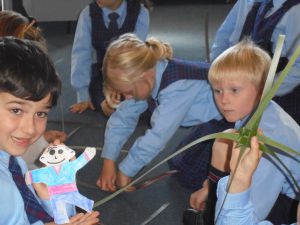
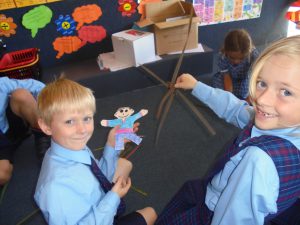
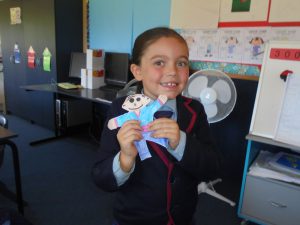
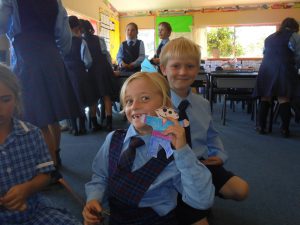
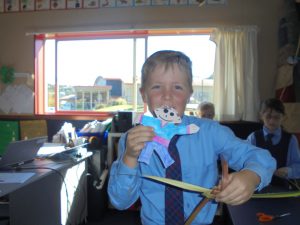
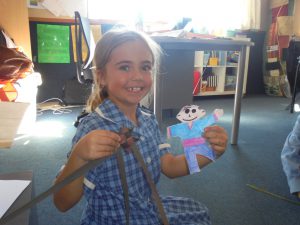
We had a visitor in our class he was all the way from Doha. His name was Flat Stanley. We were given the task to have some adventures with Flat Stanley.

This is Flat Stanley!
The photos below show us with Flat Stanley weaving our stars.







We have been learning how to write and give instructions. Firstly we watched a you tube clip on how to make a paper helicopter. We then wrote instructions on how to make the helicopter for a year 4 student to follow. From this exercise we discovered written instructions alone were not adequate. Therefore we discussed how we could improve by drawing diagrams along with the instructions, draw pictures/diagrams only and making a movie with oral instructions. We have broken up into teams and trying out which set of instructions are most successful You will have to wait for the outcome but this is how our written instructions worked out or not!!
This is us giving instructions and the outcome.
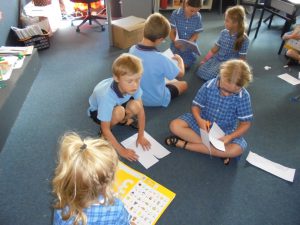
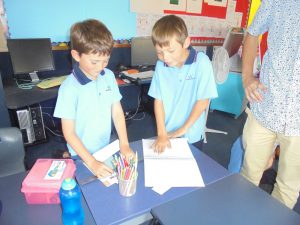
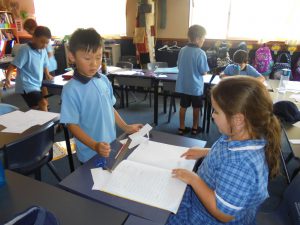
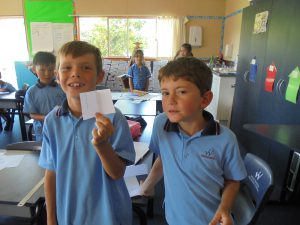
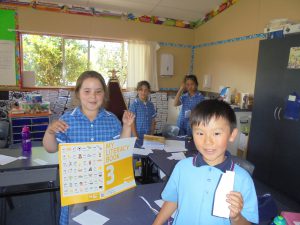
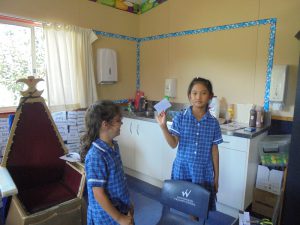
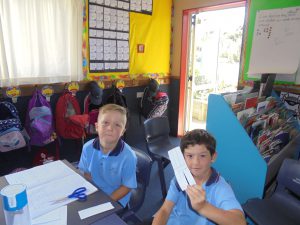
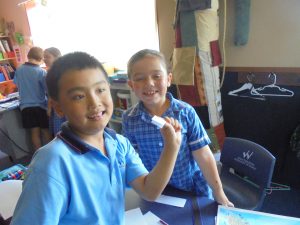
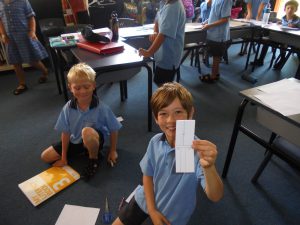
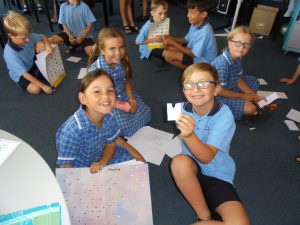
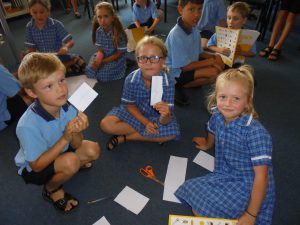
This is what the helicopter should have looked like.
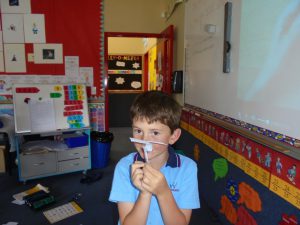
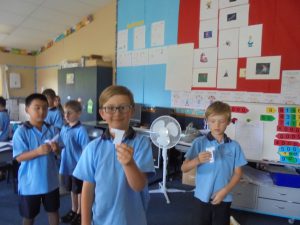
Whoever thought pitching tents, eating pikelets, and playing games in the sun could be so much fun!! Egg throwing and catching was interesting especially when some people got egged. Lastly we finished by having an Easter egg hunt. It was really difficult as we had to find two halves of a laminated egg with the same pattern. At times we had to negotiate with others that had the same pattern.
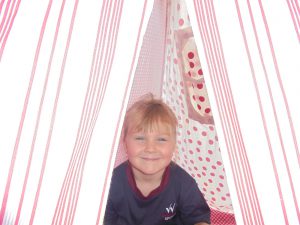
Nice and cosy!
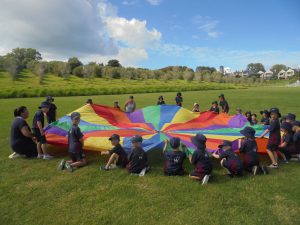
Now you see us!
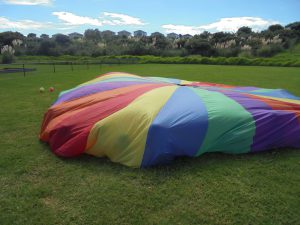
Now you don’t!
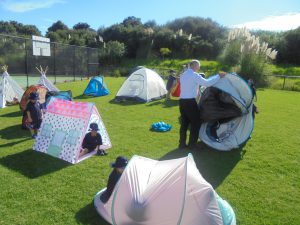
You can always do with a mans touch.
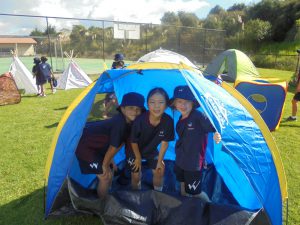
How many people can fit in a tent?
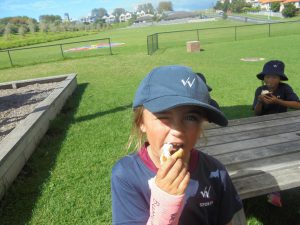
My face does say yum, really!!
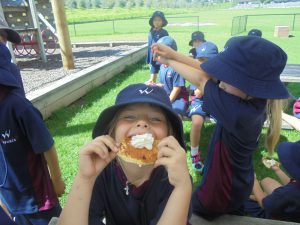
Cream, cream and more cream.
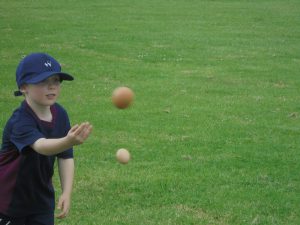
Catch that egg!
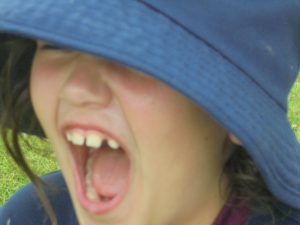
I’ve just been egged
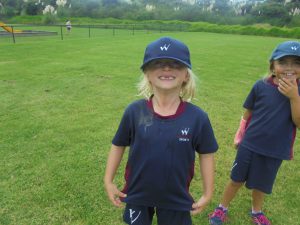
Evidence of getting egged, so funny
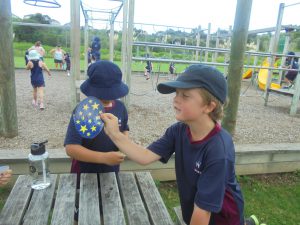
I finally found two halves that match.
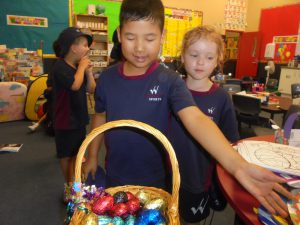
Big decisions, what one to choose.
Come see how much fun we have learning Mandarin through music and movement with Bing.
In Year 3 we have been using measuring equipment to explore what it used to measure and the units we measure with.
First we used balance scales and weights to explore how much a piece of fruit or vegetable weighed.
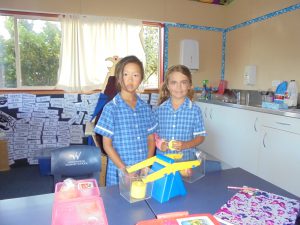
We discovered:
1 apple weighed 139gms
1 mandarin weighed 74gms
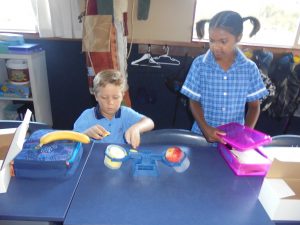
We discovered:
1 apple weighed 150gms
1 plum weighed 280gms
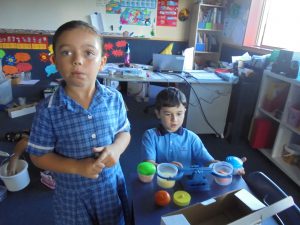
We discovered:
1 mandarin weighed 70gms

We discovered:
1 apple weighed 99gms
1 carrot weighed 42gms
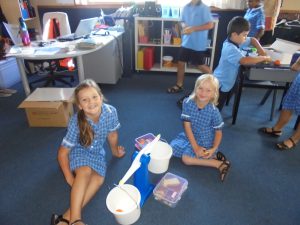
We discovered: 1 banana weighed 160gms 1 mandarin weighed 60gms
Next we used rulers, and tape measures to measure different things in the classroom.
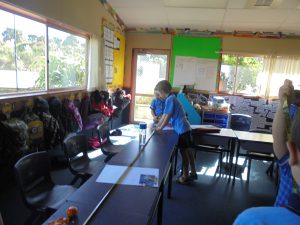
We used a retractable tape measure to
find out how long a row of desks is.
We discovered it was 3.1m long.
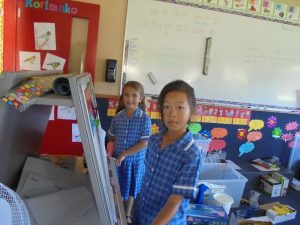
We used a tape measure to measure the
length of the small whiteboard.
We discovered it was 91.5cms.
Then we used force meters to weigh our school bags. Look at how much our school bags weigh, at this rate we will be weight lifters!
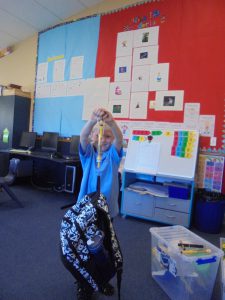
I discovered my bag weighed
2kg.
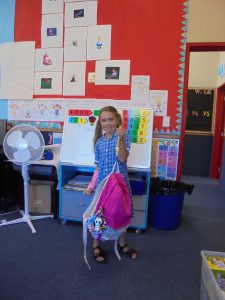
I discovered my bag weighed
2.2kg
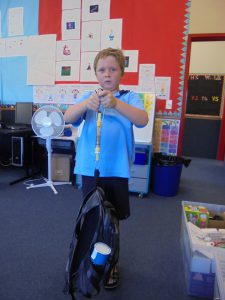
I discovered my weighed
2.5kg
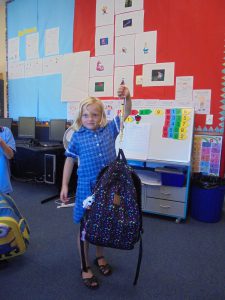
I discovered my bag weighed
2kg.

I discovered my bag weighed
2kg.
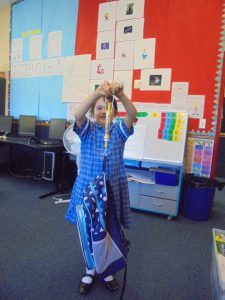
I discovered my bag weighed
2kg.
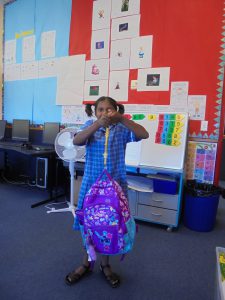
I discovered my bag weighed
3kg.
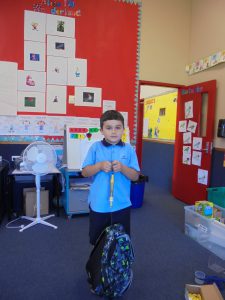
I discovered my bag weighed
2.5kg
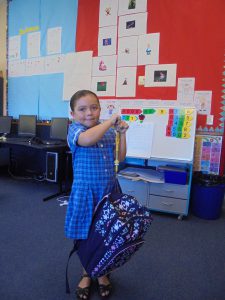
I discovered my bag weighed
2.5kg
Our last task was to explore how much water weighed.
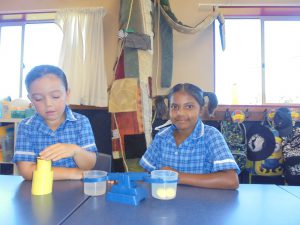
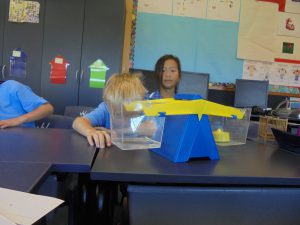
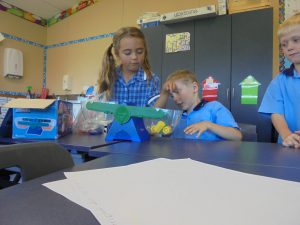
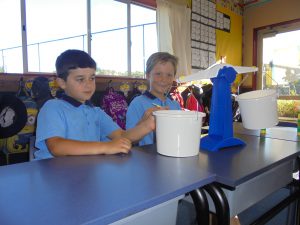
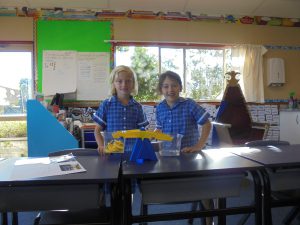
We discovered weighing water was tricky with the balance scales as they kept moving.
We all found out that 100mls weighs 100gms therefore 500mls weighed 500gms.
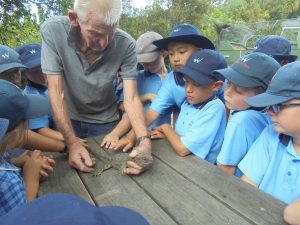
The tuatara is unique to New Zealand. He felt cold to touch. It had spines on his back and has three eyes. By Olivia
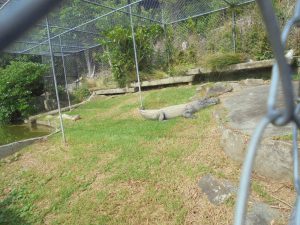
Alligators have a very big jaw and have
extremely powerful tails. By Sophie
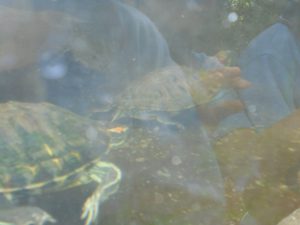
The baby turtles are so cute and small.
Some baby turtles necks are as long as
a Giraffes. By Sophie
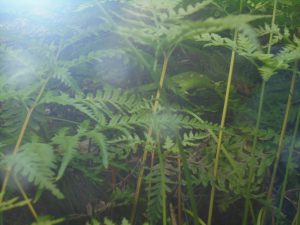
Can you spot the green gecko? I can!
By Daniel
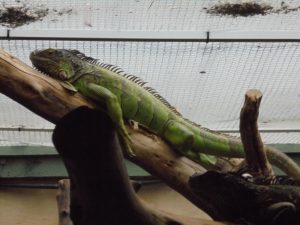
The spikes on the iguana is to make it look big and scary. By Daniel
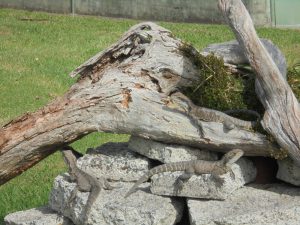
These water dragons are sunbathing
to warm up as they are cold blooded.
By Alex
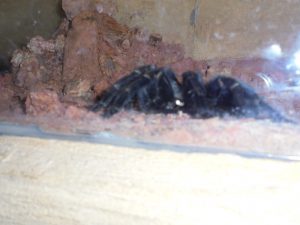
Imagine this guy lurking around in your
attic!! By Alex
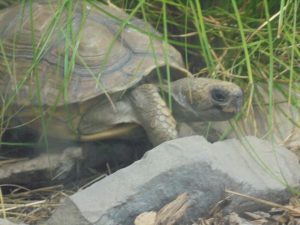
A tortoise is a reptile and it is slow moving.
It has a hard shell on it’s back.. It is cold
blooded. By Anna
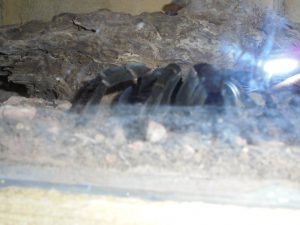
A tarantula is a mammal and it is furry.
It makes a web out of glass string.
By Anna
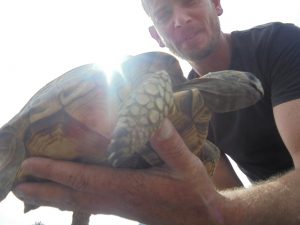
The tortoise has lots of scales on its short
legs. It’s tough shell has patterns like
people have finger prints to tell them apart
from each other. By Michael
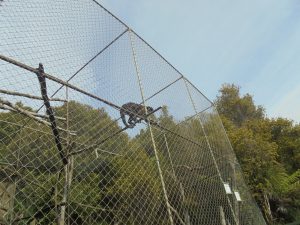
This monkey is 40 years old. It lives
in a huge cage. His name is Harrison.
By Michael
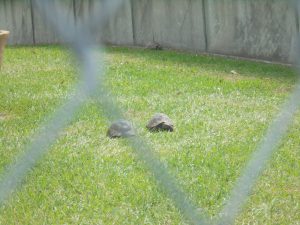
The tortoises are very slow and bumpy. They can live for a long time and grow till they are gigantic. When I touched the turtles
shell it felt rough. By Isabella
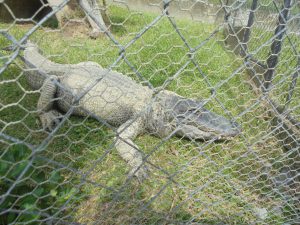
Alligators are long and brave. They have
prickly looking bumps on their backs.
This one was very fat and can lay eggs.
By Ashlee
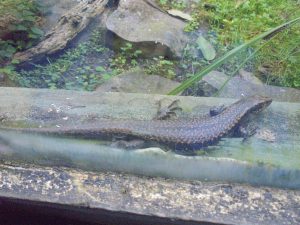
This skink was sunbathing to warm up.
They are cold blooded so need the sun
to get warm. By Ashlee.
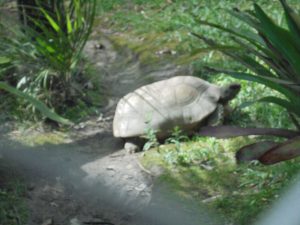
The tortoise is very slow and the shell
is so rough to touch.
By Charlee
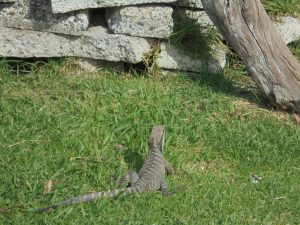
Look at the bumpy and dry scales on the
water dragon. By Charlee
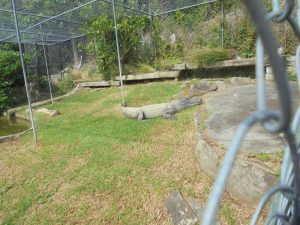
The alligator has long teeth.
By Khushboo
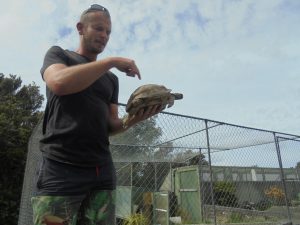
I touched the tortoise. The tortoise shell
is like his bones.
By Khushboo
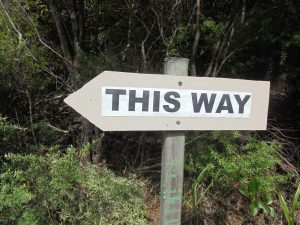
Lucky there were signs to tell us which
way to go. By Ciaran

This turtle can swim in deep waters and walk on land. It has a very long neck. By Ciaran.
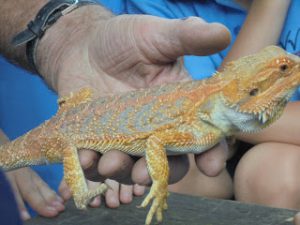
The bearded dragon felt soft and warm to touch. He can climb trees very well. By Olivia
The stunning and clever Korimako class would like you to see their wonderful comical portraits they created of themselves.
To create these fantastic pieces the children experimented using paint for their faces. The children had lots of fun tracing around their hands and feet and decorating them using coloured pencil and outlining them using vivid. We discovered it was not so easy to trace around our own hands and feet and required some assistance from our classmates. We also discovered we need lots of practice cutting out as some of us lost ends of fingers and toes.
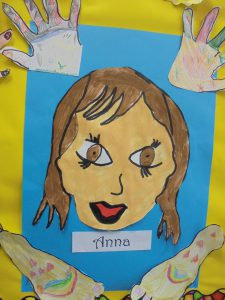
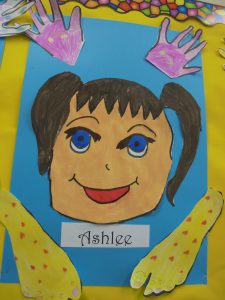
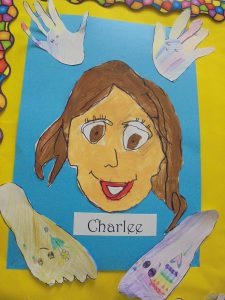

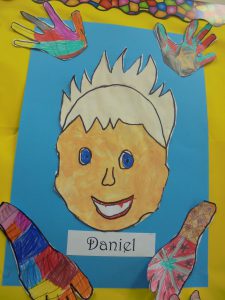
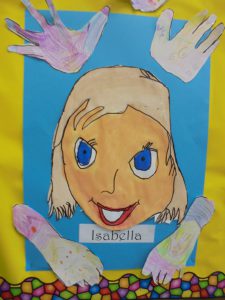
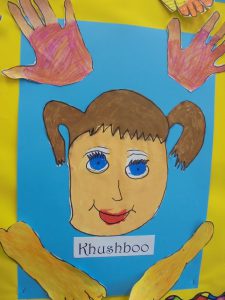
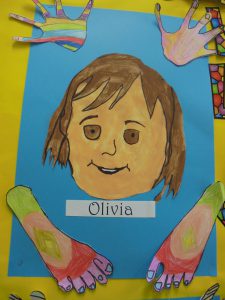
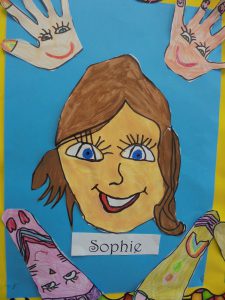
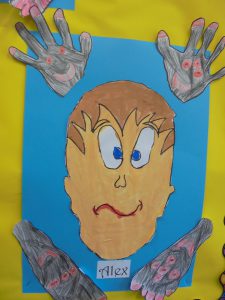
Welcome to Korimako Class of 2018.
Korimako is the Maori name for the Bellbird. We decided to call ourselves Korimako because we think we are cheerful and tuneful class, just like the Bellbird.
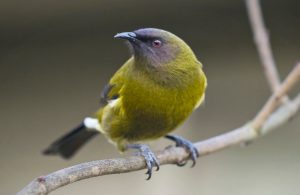
We have a friend with no name. We have looked at it characteristics to suggest names for it. Another problem we have we do not know it’s gender. We have discovered some interesting things about the bird. It decided to peck the sapphire from Mrs King’s ring.
Have a look at all our ideas to help us decide a name.
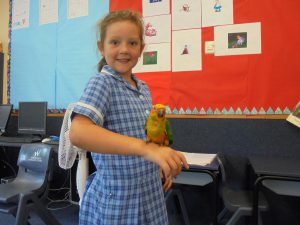
I think the bird is soft, crazy and cheeky.
It is a fussy eater. I think we should call it,
Gemstone if it is a girl Mischief for a boy.
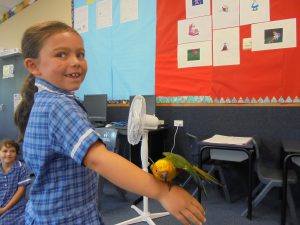
I think the bird is cheeky, a thief. It loves climbing.
When it goes on my hand it feels weird.
I think we should call it Lenny.
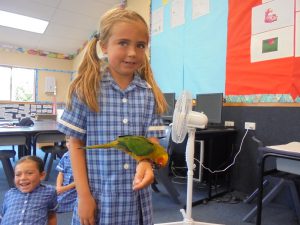
I think the bird is naughty, jewelry thief, cheeky, funny and clever.
It is a messy eater and fussy eater. It is very colourful.
I think it should be called Polly.
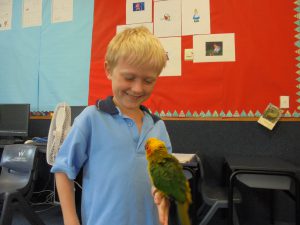
I think the bird is cute, nice, and clever. It is
cheeky. It has a grip that feels spiky when
you hold it. I think we should name it Jeff.
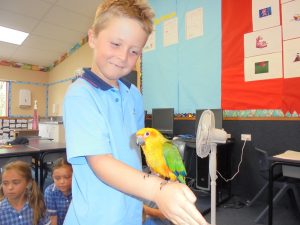
The bird is very pretty, cheeky and a very big trickster.
It is a jewelry thief. It has sharp claws.
If it is a boy we should call it Fruit or a girl Watermelon.
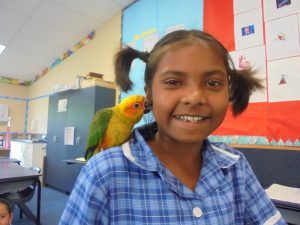
I like the bird because it is clever and it is
colourful.
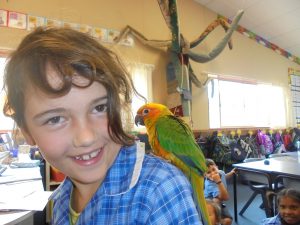
The bird is smart, naughty, cheeky and funny.
It has sapphire blue on it’s tail with sparkly eyes.
It looks like a lemon. I think we should name
it Sapphire.
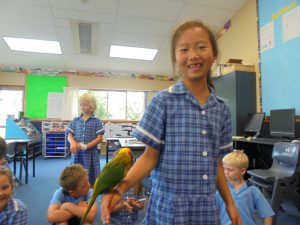
The bird is soft, funny and cheeky. It is colourful with big eyes.
We should name it Nesha.
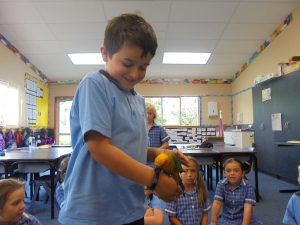
The bird is a jewel thief and very cheeky.
We should call it Mr Poop.
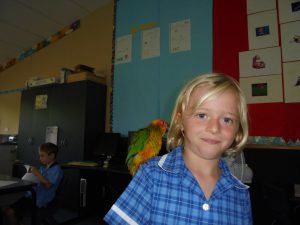
I think the bird is cheeky and naughty. It’s feet are soft. It likes to peck sparkly things. If it’s a boy it should be called Pluto or a girl Peck.
